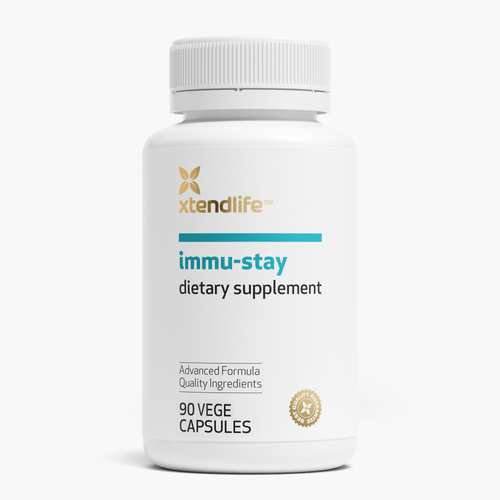Fortunately, there is plenty we can do to build our bodies’ natural defences and keep those winter colds and flu at bay.
How does the immune system work?
Our immune system is a sophisticated network of organs, chemicals and cells which work together to protect us from pathogens (foreign objects which cause diseases such as bacteria, viruses and fungi). The immune system has three levels:
The first line of defence is sometimes referred to as ‘innate’ or ‘non-specific’ immunity and includes the epithelial cells in the skin, nose and throat which provide a physical barrier to pathogens, as well as mucous and fine hairs that line the respiratory and digestive tracts and chemicals and enzymes found in sweat, saliva, tears and hydrochloric acid which destroy pathogens.
If pathogens make it through this protective layer, our second level of defence kicks in: white blood cells called phagocytes and macrophages which “eat” foreign materials. Our third level of defence is our T and B lymphocytes which produce chemicals and antibodies to destroy foreign objects and infected body cells. T and B lymphocytes are part of our immunological memory, i.e. they remember pathogens encountered in the past and can activate a response when this same bug is encountered again.
Our immune system continues to adapt and develop over the course of our lifetime as we are exposed to new pathogens. Building a strong immune system is not about protecting our body from exposure to pathogens, but providing our body with a strong foundation to enable it to respond quickly and appropriately when we do encounter nasties.
Your Prescription for Winter Immunity
Solid foundations
Taking care of winter immunity means more than just an emergency response if we do catch a cold - although natural medicine does provide us with lots of options here. A strong immune system relies on a strong level of foundational health. Good health foundations make our bodies resilient – meaning if we do fall acutely ill, our body is able to promptly fight off the illness.
We build strong foundational health with good sleep, exercise and by providing our cells with quality nutrition. A healthful diet is the starting point, but it is difficult to obtain all the nutrients we need through diet alone, so quality immune system support through supplementation is important. Xtend-Life’s Total Balance range contains all the nutrients your body needs for optimum health and to build good immunity.
Vitamin C
The old favourite, Vitamin C increases production of interferon, one of the body’s main immune chemicals and also enhances white blood cell activity[2]. Get it from kiwifruit, strawberries, chillies, capsicum, tomatoes, green vegetables and citrus fruit.
Vitamin A
Lesser known than Vitamin C but no less important, Vitamin A plays a dual role in keeping those winter colds at bay. Firstly, it is needed for the formation and protection of epithelial tissue, our first barrier of defence. Epithelial tissue includes both the outer skin and the mucous membranes which line our nose, throat and digestive system. Vitamin A deficiency can cause changes in this epithelium layer, allowing pathogens to enter your body more easily.
Secondly, Vitamin A has a direct impact on immune function, and both cell-mediated and antibody-mediated immunity are affected when Vitamin A levels are low. Get Vitamin A from eggs, oily fish (mackerel, salmon and sardines), organic dairy foods and, if you can bear it, organic liver. Beta-carotene is the precursor to Vitamin A and is found in orange and yellow coloured vegetables such as carrots, sweet potato, red and orange capsicum, tomatoes and apricots.
Unique Effective Blend
Packed with flu-fighting ingredients like Turmeric, Zinc, Selenium, Olive Leaf and Vitamin C, Immu-Stay may help reduce the severity and duration of colds.
Shop now
Protein
We need protein for the production of almost everything in our bodies from hormones and antibodies to bones and muscles - and everything in between. Without protein, no growth or repair takes place, so if your diet is protein-light you might have trouble fighting off those colds and flus. Include a source of protein at every meal – e.g. eggs or muesli with yoghurt and nuts for breakfast, falafel, tempeh or chicken in your lunchtime salad and steak, salmon or legumes for dinner. Snack on protein-rich nuts, yoghurt or cheese and crackers.
Sugar
Give that muffin a miss if you want to avoid the flu this winter. Sugar inhibits phagocytosis, the process by which viruses and bacteria are engulfed and then literally eaten up by white blood cells.[3] Cut the juice, soft drinks and processed foods and swap cookies and cakes for refined sugar-free baking – treats sweetened with dates, rice malt syrup, honey and whole maple syrup are just as tasty and simple to make. Sugar is hidden in many packaged foods – including yoghurt, sauces, pre-packaged meals, breads and spreads, so read labels carefully.
Sleep
Burning the midnight oil on the regular? You might want to start hitting the sack earlier. Lack of sleep can actually increase your risk of catching a cold or flu. During sleep, our bodies recover and repair, and when we are not getting enough, our immune function is impaired. Arrange your evening routine to ensure you get a minimum of eight hours a night and wherever possible, allow yourself to have a bit of lie in on weekends.
And if you do fall ill, resist the temptation to soldier on. Sleep is the single most important thing you can do to help you recover faster. Go to bed early and take a day off work. Your colleagues will thank you for not sharing your cold!
Hydration
Drink up to both prevent and treat colds and flus. Water is essential for the health and function of every body cell and helps to flush out disease-causing toxins and microbes. Even if you don’t feel like eating or drinking when unwell, it is essential to stay hydrated. Drink at least two litres per day every day.
Exercise
Kick that cold right out of your life! Exercise moves the lymphatic system, helping to clear toxins and encouraging antibodies and white blood cells to circulate more rapidly – meaning they may detect and respond to pathogens faster. Try to exercise 5-6x a week, doing a combination of cardiovascular and resistance training. However, avoid too much strenuous exercise (e.g. long cycling or running sessions) as this can actually weaken the immune system. Stick to gym sessions of 25-45 minutes, and enjoy gentler forms of activity like walks, yoga, pilates, swimming, kayaking, dancing to see the same results – and keep your immune system strong.
If you do catch a cold, it’s best to rest totally for a few days to allow your body to focus on healing. If your symptoms are from the neck up – sniffles, sore throat or head cold – gentle exercise such as walking, yoga and pilates are safe, but if you have a cough or muscle aches and pains, you should rest totally until you feel better.
Stress
Not only does stress impact our sleep, mood and energy levels, it also impairs our immune system. The chronically elevated cortisol levels associated with long term stress can depress white blood cell activity.[4] While there is no way to eliminate stress completely from your life, there are ways to actively manage it – avoid toxic people and environments, outsource what you can and make time every week to do things you enjoy – catch up with friends, do yoga, spend time in nature, workout, cook, meditate.
Mix and mingle
Happiness really is the key to good health - optimists are more likely to live longer, experience fewer illnesses and take better care of themselves than people with a negative outlook. Social contact helps us feel connected and provides a sense of belonging and purpose. Make time every week to see friends, spend quality time with your partner, do volunteer work, get a pet, invite a colleague for coffee. And laugh – it’s good for you.
Sunshine
Vitamin D really is the miracle vitamin. Besides protecting our bones and mental health, the sunshine vitamin also plays a vital role in supporting our immune system. Get outside for 15-20 minutes every day with arms and legs exposed to meet your daily needs. In the long dark days of winter, it can be difficult to meet your RDI so consider taking a supplement.
Kiwifruit
With over 70% of your immune system located in your digestive system, a healthy guy is essential to keep winter lurgies at bay. Our digestive system has a delicate balance of good and bad bacteria but the modern diet, rich in processed foods, alcohol, sugar, antibiotics and other medications can upset this precise balance, allowing bad bacteria to proliferate. An unhealthy balance of bacteria in the gut can impair immune function, reducing our resistance to colds and flus.
Fortunately, prebiotics found in many fruit and vegetables can help to restore the balance. Kiwifruit is particularly high in prebiotics and helps to soothe digestive function - plus it’s super high in Vitamin C to help further boost immune function. Eat a couple of kiwifruit every day through winter, or consider a supplement.
Zinc
One of the busiest minerals in our bodies, zinc is responsible for over 200 essential enzymatic reactions – including immune function[5]. Zinc is needed to create T and B lymphocytes and macrophages – white blood cells that recognise bugs and fight infection. A powerful antioxidant, Zinc also helps protect cells from free radical damage. Get your zinc fix from mussels, oysters, steak, poultry, eggs and pumpkin seeds.
Iron
Iron plays an integral role in boosting immunity and keeping colds and flus at bay[6]. Low iron levels are typically associated with frequent infections and poor wound healing. Tuck into slow-cooked lamb shanks, casseroles and mince dishes this winter to get your daily requirement. Vegetarians can enjoy eggs, molasses, dried apricots, lentils and other legumes.
References:
[1] Experts Predict Severe Flu Season in US.Vitamin Retailer Magazine. September, 2017.
[2] Kim Y, Kim H, Bae S, Choi J, Lim SY, Lee N, Kong JM, Hwang YI, Kang JS, Lee WJ. Vitamin C Is an Essential Factor on the Anti-viral Immune Responses through the Production of Interferon-α/β at the Initial Stage of Influenza A Virus (H3N2) Infection. Immune Netw. 2013 Apr;13(2):70-4.
[3] Sanchez, A., Reeser, J., Lau, H., Yahiku, P., Willard, R. McMillan, P., Cho, S., Magie, A. and Register, U. Role of sugar in human neutrophilic phagocystosis. American Journal of Clinical Nutrition, November 1973, 26: 11 (1180-1184)
[4] Segerstrom, S. and Miller, G. Psychological Stress and the Human Immune System: A Meta-Analytic Study of 30 Years of Inquiry. Psycho Bull, February 2006.
[5] Prasad, A. Zinc and Immunity.Molecular and Cellular Effects of Nutrition on Disease Processes. (63-69.)
[6] Farthing, M. Iron and Immunity. Acta Paediatrica Scandinavica. Supplement January 1989, 361 (44-52)


 Supplements
Supplements Bundles
Bundles
















